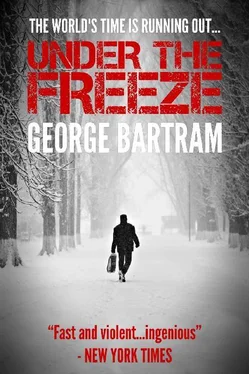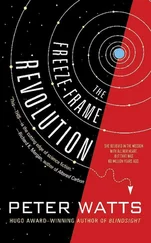“Are you the caretaker?” Tarp said in French to the old man.
“Yes.” The old man looked at the car and the ground and at Tarp. “You are the monsieur?”
“Have you got your instructions?”
He shrugged. He looked around himself, as if for witnesses. “I am not a servant.”
“Who takes care of food?”
He jerked his head. “She does. She is all right.” He said it as if Tarp had said the woman was not all right.
“Where do you sleep?”
“Downstairs. In the back.”
“And her?”
“With me, with me, what do you think?”
“Who is in charge?”
The old man looked at the woman. She looked as if she were going to cry. “Who is in charge?” Tarp said again.
“You are, monsieur.”
“Good. Do not forget it.” He looked down the rutted track as a Fiat with two French security men in it appeared. “And these?”
“They stay at the next farm.” The old man spat. “Filth.” Tarp touched the woman’s arm. When he took his hand away, she covered the place as if he had burned her. “Get us something to eat,” he said.
“What?”
“Bread, eggs. Cheese. Whatever there is. Coffee.”
“There is no coffee,” she said.
“Buy some.”
She stared at him. “Where?”
The old man stepped between them. “We are not from around here. We were brought in. We are not experts on the neighborhood. We are not responsible for buying.”
“You are now,” Tarp said. “Go buy coffee, sugar, jam. Now . If you do not know where to buy such things within an hour, I will kick your ass from here to the end of that road.”
The old man tried to look him in the eye but could not, so he turned aside and spat. He had been a big man who had probably used his size to bully people as he now bullied the woman, but now his muscle had all gone slack and his bigness was mere weight. The two security men had gotten out of the Fiat and were watching the scene, enjoying it; the old man glanced at them and muttered, “Filth.”
Tarp lowered his voice. “You are old,” he said. “It would be unfair of me to hurt you.” He put his mouth very close to the old ear, which was filled with dark hairs. “Do not force me to be unfair. I would feel very bad if I had to do something to you, because I am so much younger and stronger.” He put his left hand on the man’s jaw and turned the head so that their eyes met. “But I am the kind of man who would do it. Eh?”
The head jerked. Tarp relaxed his hold. “Good. Go buy some food.” He turned toward the two security men, who were smiling cruelly. Tarp walked the few yards to them. There was a puddle in the road and he stepped over it, feeling his shoe sink into the ring of mud on the far side. “We are going to be a family here,” he said. “I hope it will not be unpleasant.”
“Why should it be unpleasant?” one of them said. He had wide, childlike eyes, plump cheeks, and not much chin. His cheeks were permanently flushed, and, perhaps because he knew he looked so boyish, he wore a huge mustache.
“So that we understand each other,” Tarp said quietly. “I am in charge here. You are not my jailers.”
The other man, who was also young but who had a clipped dark beard and looked older, said, “We know our job.”
“Good. When is the Cuban woman coming?”
“Maybe tomorrow.”
“Good. And Laforet?”
He shrugged.
“I need to talk to Laforet. Is there a telephone?”
“In the village.”
“But you have communications.”
The man shrugged again. Tarp decided not to press it just then. “There will be coffee,” he said. He went inside and looked over the house, which had been empty for months. There was very little furniture. Downstairs was a kitchen with an enormous wood range; a large room that took up most of the ground floor; and a very small room with wallpaper, as if it had had aspirations toward being a parlor. Upstairs there were four small bedrooms. Repin had already commandeered one that had a wooden bedstead in it with a mattress but no bedclothes. A new sleeping bag lay rolled on the bed. Repin picked it up, dropped it. “I lived better in Indochina,” he said disgustedly. “You lived like a prince in Indochina.”
“Only some of the time. This place stinks.”
“It needs airing out.”
Tarp picked a room for himself. Like Repin’s, it had a new sleeping bag on the bed. One of the other rooms had had a hospital bed moved into it for Juana.
Tarp went downstairs again and found the frightened woman coming into the kitchen from the back with five eggs in her hands, which she carried cupped against her belly like a woman in a medieval painting. As if to emphasize the freshness of the eggs, a chicken cackled outside, and then a cockerel jumped up into the open window and strutted. The woman with the eggs stood looking at it; Tarp looked at them both. The picture that they made seemed ancient and full of symbols, but he could not understand them because he was so tired or because he was alienated from them.
He slept most of the day, then woke when the sound of a helicopter passed close overhead and went toward the village. Some minutes later he heard the voice of one of the guards, calling up the stairs, “The chief is coming!”
Tarp smelled coffee and something wonderful, full of onions and perhaps chicken. He rolled out of the sleeping bag and went downstairs carrying his shoes. The woman had built a fire in the range and there was a huge pot there, cooking. There were chicken feathers on the floor and a little dried blood on the windowsill. Tarp was wearing the same clothes he had driven from London in and the trousers they had given him in Paris after the attack in the restaurant. “Hot water,” he said to the woman. She stared at him. “To shave.”
“Ah.”
The only running water came from a tap in the kitchen. The toilet was a separate stone privy next to one of the barns, with a stone urinal through which water always ran and a filthy flush toilet that had a tank high above and a chain pull. Tarp told himself that it would have to be cleaned and went back into the kitchen. “What is your name?” he said to the woman as she filled a black iron kettle from the tap.
“Therese.”
“Are you the old man’s wife?”
“He is my stepfather.”
He took a small pan of hot water upstairs and borrowed a razor from Repin, who had provided for himself in London. Repin carried a scuffed leather case that he had brought with him from the doomed aircraft, and Tarp supposed that he had the makings of a new life in it: currency, perhaps some gold; somewhere sewn into the lining or the handle, a strip of microfilm that he could use to bargain for freedom and security. Repin was a survivor.
His room was small. Half of it had a sloping ceiling. A single window opened outward on a view of the privy roof and the collapsing barns. The bed was high; in a corner was the squat washstand where he stood to shave. Against the only other wall was a massive wardrobe that was black as if from charring. He stripped, gathered the dirty clothes into a bundle, put on the trousers and the shoes, and went down again to the kitchen.
“Wash these,” he said, handing her the clothes. “Then dry them over the stove. Quickly. They are all I have.”
She looked at his bare torso. He had a long scar that seemed to fascinate her. She put the dirty clothes into the zinc-covered sink and went out the back and came in again with an old jersey that was frayed and faded but as soft as cashmere from much washing. She held it out to him.
“Thank you.”
He pulled it over his head. When he pulled it down from his eyes, he found that she was still looking at him, her hands cradled in front of her belly as if she were waiting for him to put more eggs into them.
Читать дальше












